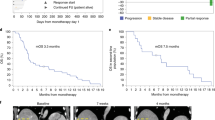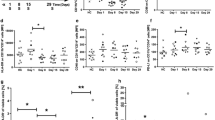Abstract
In pre-clinical models, the only two chemotherapy drugs which have been demonstrated to directly reduce the number of myeloid-derived suppressor cells (MDSCs) are gemcitabine and 5-fluorouracil. Here we analyze the dynamics of MDSCs, phenotyped as Lin-DR-CD11b+, in patients with advanced pancreatic cancer receiving the combination of gemcitabine and capecitabine, a 5-FU pro-drug. We found no evidence that gemcitabine and capecitabine directly reduce MDSC% in patients. Gemcitabine and capecitabine reduced MDSCs in 42 % of patients (n = 19) and MDSC% fell in only 3/9 patients with above-median baseline MDSCs. In 5/8 patients with minimal tumour volume change on treatment, the MDSC% went up: increases in MDSC% in these patients appeared to correlate with sustained cancer-related inflammatory cytokine upregulation. In a separate cohort of 21 patients treated with gemcitabine and capecitabine together with concurrently administered GV1001 vaccine with adjuvant GM-CSF, the MDSC% fell in 18/21 patients and there was a significant difference in the trajectory of MDSCs between those receiving GV1001 and GM-CSF in combination with chemotherapy and those receiving chemotherapy alone. Thus, there was no evidence that the addition of low-dose adjuvant GM-CSF increased Lin-DR-CD11b+ MDSC in patients receiving combination chemoimmunotherapy. 9/21 patients developed an immune response to GV1001 and the MDSCs fell in 8 of these 9 patients, 6 of whom had above-median pre-vaccination MDSC levels. A high pre-vaccination MDSC% does not preclude the development of immunity to a tumour-associated antigen.


Similar content being viewed by others
References
Bronte V, Serafini P, De Santo C, Marigo I, Tosello V, Mazzoni A et al (2003) IL-4- induced arginase 1 suppresses alloreactive T cells in tumor-bearing mice. J Immunol 170:270–278
Srivastava MK, Sinha P, Clements VK, Rodriguez P, Ostrand-Rosenberg S (2010) Myeloid-derived suppressor cells inhibit T-cell activation by depleting cystine and cysteine. Cancer Res 70:68–77
Hanson EM, Clements VK, Sinha P, Ilkovitch D, Ostrand-Rosenberg S (2009) Myeloid- derived suppressor cells down-regulate L-selectin expression on CD4+ and CD8+ T cells. J Immunol 183:937–944
Nagaraj S, Gupta K, Pisarev V, Kinarsky L, Sherman S, Kang L et al (2007) Altered recognition of antigen is a mechanism of CD8+ T cell tolerance in cancer. Nat Med 13:828–835
Lu T, Ramakrishnan R, Altiok S, Youn JI, Cheng P, Celis E et al (2011) Tumor-infiltrating myeloid cells induce tumor cell resistance to cytotoxic T cells in mice. J Clin Invest 121:4015–4029
Gabitass RF, Annels NE, Stocken DD, Pandha HA, Middleton GW (2011) Elevated myeloid-derived suppressor cells in pancreatic, esophageal and gastric cancer are an independent prognostic factor and are associated with significant elevation of the Th2 cytokine interleukin-13. Cancer Immunol Immunother 60:1419–1430
Middleton GW, Valle JW, Wadsley J, Propper D, Coxon FY, Ross PJ et al (2013) A phase III randomized trial of chemoimmunotherapy comprising gemcitabine and capecitabine with or without telomerase vaccine GV1001 in patients with locally advanced or metastatic pancreatic cancer. J Clin Oncol 31(suppl; abstr LBA4004)
Suzuki E, Kapoor V, Jassar AS, Kaiser LR, Albelda SM (2005) Gemcitabine selectively eliminates splenic Gr-1+/CD11b+ myeloid suppressor cells in tumor-bearing animals and enhances antitumor immune activity. Clin Cancer Res 11:6713–6721
Vincent J, Mignot G, Chalmin F, Ladoire S, Bruchard M, Chevriaux A et al (2010) 5- Fluorouracil selectively kills tumor-associated myeloid-derived suppressor cells resulting in enhanced T cell-dependent antitumor immunity. Cancer Res 70:3052–3061
Curran MA, Allison JP (2009) Tumor vaccines expressing flt3 ligand synergize with ctla-4 blockade to reject preimplanted tumors. Cancer Res 69:7747–7755
Filipazzi P, Valenti R, Huber V, Pilla L, Canese P, Iero MC, Mariani L, Parmiani G, Rivoltini L et al (2007) Identification of a new subset of myeloid suppressor cells in peripheral blood of melanoma patients with modulation by a granulocyte-macrophage colony-stimulation factor-based antitumor vaccine. J Clin Oncol 25:2546–2553
Eisenhauer EA, Therasse P, Bogaerts J, Schwartz LH, Sargent D, Ford R et al (2009) New response evaluation criteria in solid tumours: revised RECIST guideline (version 1.1). Eur J Cancer 45:228–247
Kotsakis A, Harasymczuk M, Schilling B, Georgoulias V, Argiris A, Whiteside TL (2012) Myeloid-derived suppressor cell measurements in fresh and cryopreserved blood samples. J Immunol Methods 381(1–2):14–22
Diaz-Montero CM, Salem ML, Nishimura MI, Garrett-Mayer E, Cole DJ, Montero AJ (2009) Increased circulating myeloid-derived suppressor cells correlate with clinical cancer stage, metastatic tumor burden, and doxorubicin-cyclophosphamide chemotherapy. Cancer Immunol Immunother 58:49–59
Solito S, Falisi E, Diaz-Montero CM, Doni A, Pinton L, Rosato A, Francescato S, Basso G, Zanovello P, Onicescu G, Garrett-Mayer E, Montero AJ, Bronte V, Mandruzzato S (2011) A human promyelocytic-like population is responsible for the immune suppression mediated by myeloid-derived suppressor cells. Blood 118(8):2254–2265
Bunt SK, Yang L, Sinha P, Clements VK, Leips J, Ostrand-Rosenberg S (2007) Reduced inflammation in the tumor microenvironment delays the accumulation of myeloid-derived suppressor cells and limits tumor progression. Cancer Res 67(20):10019–10026
Dolcetti L, Peranzoni E, Ugel S, Marigo I, Fernandez Gomez A, Mesa C, Geilich M, Winkels G, Traggiai E, Casati A, Grassi F, Bronte V (2010) Hierarchy of immunosuppressive strength among myeloid-derived suppressor cell subsets is determined by GM-CSF. Eur J Immunol 40(1):22–35
Lechner MG, Liebertz DJ, Epstein AL (2010) Characterization of cytokine-induced myeloid-derived suppressor cells from normal human peripheral blood mononuclear cells. J Immunol 185(4):2273–2284
Bayne LJ, Beatty GL, Jhala N, Clark CE, Rhim AD, Stanger BZ, Vonderheide RH (2012) Tumor-derived granulocyte-macrophage colony-stimulating factor regulates myeloid inflammation and T cell immunity in pancreatic cancer. Cancer Cell 21(6):822–835
Acknowledgments
This research was funded by BRIGHT: Better Research Into Gastrointestinal cancer Health and Treatment, registered charity number 1064857. The TeloVac Trial was funded by Cancer Research UK and KAEL-Gemvax.
Conflict of interest
The authors declare that they have no conflict of interest.
Author information
Authors and Affiliations
Corresponding author
Additional information
Nicola E. Annels and Victoria E. Shaw have contributed jointly to this work.
Electronic supplementary material
Below is the link to the electronic supplementary material.
Rights and permissions
About this article
Cite this article
Annels, N.E., Shaw, V.E., Gabitass, R.F. et al. The effects of gemcitabine and capecitabine combination chemotherapy and of low-dose adjuvant GM-CSF on the levels of myeloid-derived suppressor cells in patients with advanced pancreatic cancer. Cancer Immunol Immunother 63, 175–183 (2014). https://doi.org/10.1007/s00262-013-1502-y
Received:
Accepted:
Published:
Issue Date:
DOI: https://doi.org/10.1007/s00262-013-1502-y




